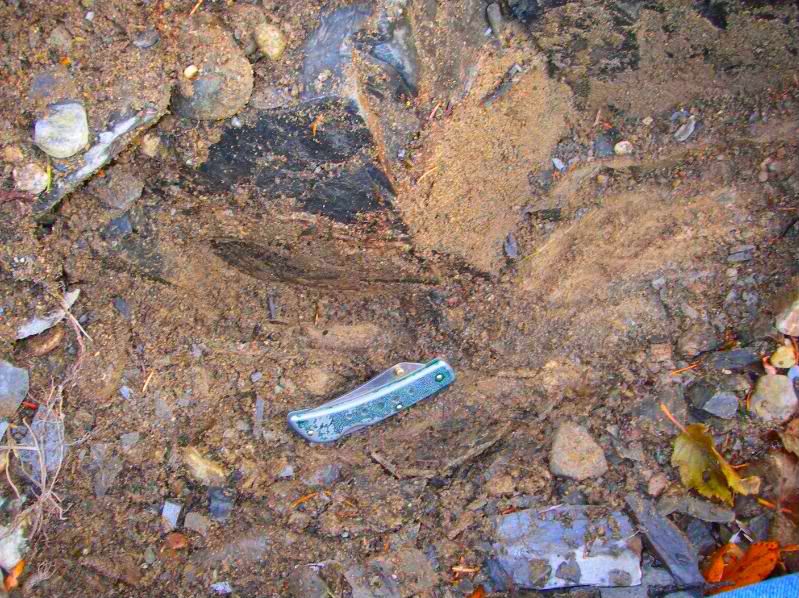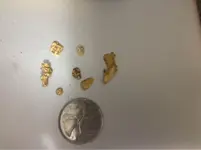Lanny in AB
Gold Member
Do you love to chase the gold? Please join me--lots of gold hunting tips, stories of finds (successful and not), and prospecting poetry.
Nugget in the bedrock tip:
I had a visit with a mining buddy this past weekend, and he told me of an epic battle to get a nugget out of the bedrock, and of what he learned from the experience. I thought some of you might like to learn from his mistake.
While out detecting one day, he came across a large sheet of bare bedrock. The bedrock was exposed because the area had been blasted off with a water cannon (a monitor), by the old-timers! It was not fractured bedrock, in fact it was totally smooth.
He was not optimistic at all of the prospects of a nugget. But, for some reason (we've all been there) he decided to swing his detector over that bedrock. After a long time, just as he was about to give up on his crazy hunch, he got a signal, right out of that smooth bedrock.
There was no crevice, no sign of a crevice, nada! So, he had to go all the way back to camp to get a small sledge and a chisel. The signal in the rock intrigued him, but he still wasn't overly optimistic. For those of you that have chased signals in a similar situation, sometimes there's a patch of hot mineralization in the bedrock that sounds off, but this spot, according to him, was sharp and clear right in the middle of the signal, not just a general increase of the threshold like you get when you pass over a hot spot in the bedrock.
Anyway, he made it back to the spot and started to chisel his way into the bedrock. If any of you have tried this, it's an awful job, and you usually wind up with cut knuckles--at the least! Regardless, he kept fighting his way down, busting out chunks of bedrock. He kept checking the hole, and the signal remained very strong.
This only puzzled him all the more as he could clearly see that it was solid bedrock with no sign of any crevice. He finally quit at the end of the day, at a depth of about a foot, but still, nothing in the hole.
An experienced nugget shooting friend dropped by the next morning to see him, and asked him how the hunt was going. My buddy related his tale of the mysterious hole in the bedrock, and told the friend to go over and check it out, and see if he could solve the riddle.
Later in the day, the other nugget hunter returned. In his hand was a fine, fat, sassy nugget. It weighed in at about an ounce and a quarter! After my friend returned his eyeballs to their sockets and zapped his heart to start it again, he asked where the nugget had come from.
Imagine his surprise when he heard it came from the mystery hole!! He asked how deep the other guy had gone into the bedrock to get it. "Well, no deeper" was his reply.
So, here's the rest of the story as to what happened. When the successful nugget hunter got to the bedrock, he scanned the surface got the same strong signal as my buddy. He widened out the hole and scanned again. Still a solid tone. He widened the hole some more so he could get his coil in, and here's the key and the lesson in this story, he got a strong signal off the side of the hole, about six inches down, but set back another inch into the side of the bedrock!!
My unlucky friend, the true discoverer of the gorgeous nugget's resting place had gone deep past the signal while digging his hole!!
Now, of course, a good pinpointer would easily solve this problem. The problem was, my buddy didn't have one, so why would he widen the hole, right? Well, the other guy was the one with more experience, and that's why he did. It was a lot more work, but what a payoff!
So, my buddy's butt is still black and blue from where he kicked himself for the next week or so for having lost such an incredible prize.
Some nugget hunting lessons are harder than others to learn. . . .
All the best,
Lanny
P.S. When in gold country--check the bedrock, regardless of whether it looks likely or not! Mother Nature likes to play games sometimes.

Nugget in the bedrock tip:
I had a visit with a mining buddy this past weekend, and he told me of an epic battle to get a nugget out of the bedrock, and of what he learned from the experience. I thought some of you might like to learn from his mistake.
While out detecting one day, he came across a large sheet of bare bedrock. The bedrock was exposed because the area had been blasted off with a water cannon (a monitor), by the old-timers! It was not fractured bedrock, in fact it was totally smooth.
He was not optimistic at all of the prospects of a nugget. But, for some reason (we've all been there) he decided to swing his detector over that bedrock. After a long time, just as he was about to give up on his crazy hunch, he got a signal, right out of that smooth bedrock.
There was no crevice, no sign of a crevice, nada! So, he had to go all the way back to camp to get a small sledge and a chisel. The signal in the rock intrigued him, but he still wasn't overly optimistic. For those of you that have chased signals in a similar situation, sometimes there's a patch of hot mineralization in the bedrock that sounds off, but this spot, according to him, was sharp and clear right in the middle of the signal, not just a general increase of the threshold like you get when you pass over a hot spot in the bedrock.
Anyway, he made it back to the spot and started to chisel his way into the bedrock. If any of you have tried this, it's an awful job, and you usually wind up with cut knuckles--at the least! Regardless, he kept fighting his way down, busting out chunks of bedrock. He kept checking the hole, and the signal remained very strong.
This only puzzled him all the more as he could clearly see that it was solid bedrock with no sign of any crevice. He finally quit at the end of the day, at a depth of about a foot, but still, nothing in the hole.
An experienced nugget shooting friend dropped by the next morning to see him, and asked him how the hunt was going. My buddy related his tale of the mysterious hole in the bedrock, and told the friend to go over and check it out, and see if he could solve the riddle.
Later in the day, the other nugget hunter returned. In his hand was a fine, fat, sassy nugget. It weighed in at about an ounce and a quarter! After my friend returned his eyeballs to their sockets and zapped his heart to start it again, he asked where the nugget had come from.
Imagine his surprise when he heard it came from the mystery hole!! He asked how deep the other guy had gone into the bedrock to get it. "Well, no deeper" was his reply.
So, here's the rest of the story as to what happened. When the successful nugget hunter got to the bedrock, he scanned the surface got the same strong signal as my buddy. He widened out the hole and scanned again. Still a solid tone. He widened the hole some more so he could get his coil in, and here's the key and the lesson in this story, he got a strong signal off the side of the hole, about six inches down, but set back another inch into the side of the bedrock!!
My unlucky friend, the true discoverer of the gorgeous nugget's resting place had gone deep past the signal while digging his hole!!
Now, of course, a good pinpointer would easily solve this problem. The problem was, my buddy didn't have one, so why would he widen the hole, right? Well, the other guy was the one with more experience, and that's why he did. It was a lot more work, but what a payoff!
So, my buddy's butt is still black and blue from where he kicked himself for the next week or so for having lost such an incredible prize.
Some nugget hunting lessons are harder than others to learn. . . .
All the best,
Lanny
P.S. When in gold country--check the bedrock, regardless of whether it looks likely or not! Mother Nature likes to play games sometimes.

Amazon Forum Fav 👍
Last edited:
Upvote
8






 ...
...


 Been there done that...the fact you are missing the gold fields here means you get it.. but just like they used to say...it ain't easy.) My goal for 2016 was to re-read this thread as I am certain I would pick up more since my first read in 2014. Life objected so I wait to employ what Lanny has preached to me so far but I can tell you his methods (in spite of my rookie status) has paid off. I will get out soon too...my site is found, there and waiting for me to prove myself.
Been there done that...the fact you are missing the gold fields here means you get it.. but just like they used to say...it ain't easy.) My goal for 2016 was to re-read this thread as I am certain I would pick up more since my first read in 2014. Life objected so I wait to employ what Lanny has preached to me so far but I can tell you his methods (in spite of my rookie status) has paid off. I will get out soon too...my site is found, there and waiting for me to prove myself. 
